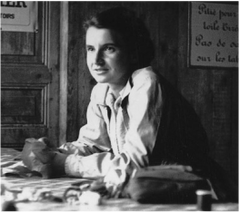
In the 1950s, a series of discoveries allowed biologists to capture and construct the double-helio structure of DNA. For these efforts, James Watson, Maurice Wilkins, and Francis Crick were awarded the Nobel Prize in 1962. The implications of this work transformed the field of biology and led to dramatic new advancements in medicine. But the story of DNA was not so simple. James Watson's personal behavior diminished the contributions of other scientists. In this episode of Footnoting History, we learn about the complex drama behind the scenes of a landmark and transformative discovery...and the complications that continue to dog the career of a prominent scientist today.
Podcaster: Lesley
Further Reading
Jennifer Glyn, My Sister Rosalind Franklin. Oxford University Press: 2012. Brenda Maddox, Rosalind Franklin: The Dark Lady of DNA. Harper Perennial: 2003. Franklin H. Portugal, A Century of DNA: A History of the Discovery of the Structure and Function of the Genetic Substance. MIT Press: 1980. Israel Rosenfeld, DNA: A Graphic Guide to the Molecule that Shook the World. Columbia University Press: 2010. Music: "Evening Melodrama" by Kevin Macleod (www.incompetech.com)
2 Comments
2/24/2015 12:48:25 am
Piecing together three mentions in this podcast, it's possible to determine that Rosalind Franklin died four years before James Watson and colleagues received the Nobel Prize for Medicine. The podcast doesn't mention that Franklin's early death meant she was no longer eligible for that prize. The sexism of Franklin's colleagues and 1950s society at large is well documented, but, contrary to how the podcast could be interpreted, it wasn't a factor in the Nobel decision.
Reply
2/24/2015 05:25:20 am
Thanks for bringing this up! I did mention at the very end, "Rosalind Franklin did not survive her bout with cancer to see the Nobel Prize awarded." But posthumous awards have been granted in the past and the various books and articles I read for this episode all emphasized the Nobel Committee's reasoning being more closely tied to her work away from the remaining three male scientists at Birkbeck rather than any other determining factor. I'm sure we could go into more dimensions about Nobel rules, but this isn't just about Watson and Franklin: it's about Watson's long-standing relationship with different groups and his recent stunt to sell the Nobel medallion.
Reply
Leave a Reply. |
Site Map |
© 2013-2024 Footnoting History. All rights reserved.
Footnoting History and the Footnoting History logo
are trademarks of Footnoting History, NY. Footnoting History operates under a SAG-AFTRA Micro-Monetized Podcast Agreement. |

